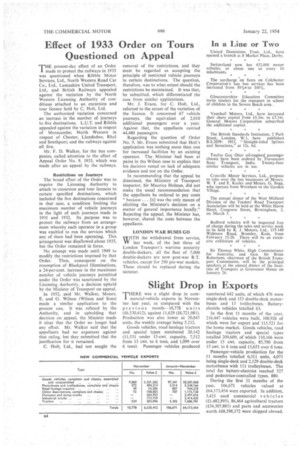Effect of 1933 Order on Tours Questioned on Appeal
Page 38

If you've noticed an error in this article please click here to report it so we can fix it.
THEpresent-day effect of an Order made to protect the railways in 1933 was questioned when Ribble Motor Services, Ltd., North Western Road Car Co., Ltd., Lancashire United Transport, Ltd., and British Railways appealed against the variation by the North Western Licensing Authority of conditions attached to an excursion and tour licence held by C. Holt, Ltd.
The authorized variation concerned an increase in the number of journeys to five destinations. L.U.T. and Ribble appealed against the variation in respect of Morecambe; North Western in respect of Chester, Llandudno, Rhyl and Southport; and the railways against all five.
Mr, F. D. Walker, for the bus companies, called attention to the effect of Appeal Order No. 9, 1933, which was made after an appeal by the railways.
Restrictions on Journeys The broad effect of the Order was to require the Licensing Authority to attach to excursion and tour licences to certain specified destinations, which included the five destinations concerned in that case, a condition limiting the maximum number of vehicle journeys in the light of such journeys made in 1931 and 1932. Its purpose was to protect the railways from an arrangement whereby each operator in a group was enabled to run the services which any of them had been operating. This arrangement was disallowed about 1935, but the Order remained in force.
No attempt was made until 1949 to modify the restrictions imposed by that Order. Then, consequent on the resumption of Blackpool Illuminations, a 24-per-cent. increase in the maximum number of vehicle journeys permitted under the Order was sanctioned by the Licensing Authority, a decision upheld by the Minister of Transport on appeal.
In 1952, said Mr. Walker, Messrs. E. and G. Wilson (Wilson and Sons) made a similar application to the present one. It was refused by the Authority, and in upholding that decision on appeal, the Minister made it clear that the Order no longer had any effect. Mr. Walker said that the appellants had no argument against that ruling, but they submitted that the justification for it remained.
C. Holt, Ltd., had not sought the removal of the restrictions, and they must be regarded as accepting the principle of restricted vehicle journeys to certain destinations. The question, therefore, was to what extent should the restrictions be maintained. It was that, he submitted, which differentiated" the case from similar applications.
Mr. J. Evans, for C. Holt, Ltd„ referred to the extent of the variation of the licence. It concerned 67 vehicle journeys, the equivalent of 2,010 additional passengers over a year. Against that, the appellants carried 44,480 passengers.
Regarding the question of Order No. 9, Mr. Evans submitted that Holt's application was nothing more than one for increased facilities by an existing operator. The Minister had been at pains in the Wilson case to explain that his decision rested on lack of adequate evidence and not on the Order.
In recommending that the appeal be dismissed, the Ministry of Transport inspector, Sir Maurice Holmes, did not make the usual recommendation that the appellants be ordered to pay costs "because ... [it] was the only means of eliciting the Minister's decision on a matter of general importance locally." Rejecting the appeal, the Minister has, however, shared the costs between the appellants.
LONDON WAR BUSES CO
wITH the withdrawal from service, last week, of the last three of London Transport's wartime austerity double-deckers, all the fleet of 7,000 double-deckers are now post-war R.T. vehicles, except for 290 pre-war models. These should be replaced during the summer.




























































































